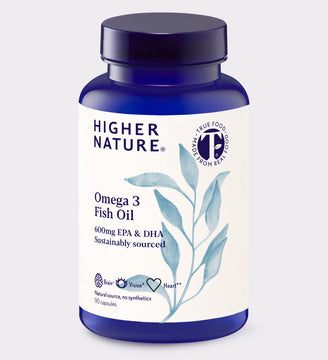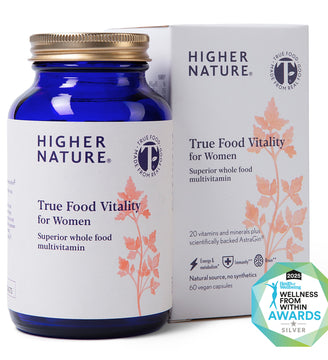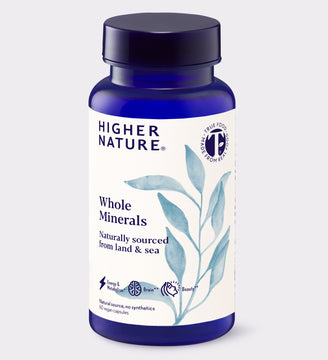
Healthy foods for a happy heart
Higher Nature Nutrition Team
Your heart beats around 70 times a minute, non-stop for around 80 years or more, pumping more than 10 million litres of blood around 100,000km of blood vessels every year. How amazing is that? And yet too many of us insist upon making this already monumentous task all the more difficult by eating foods and adopting lifestyle choices that make its job all the more harder.
Cardiovascular disease, an umbrella term used to describe all diseases to affect the heart, touches the lives of an unprecedented number of people, and heart disease is still the main cause of death in Europe.
What a sorry statistic and yet sadder still is that for many of us, problems such as high cholesterol, high blood pressure and obesity can all be avoided.
Although some risk factors such as ageing and genetics cannot be altered, we CAN determine for the most part to eat more healthily and make healthy lifestyle changes
And by taking better care of ourselves sooner rather than later, we can hopefully start to stack the odds in our favour.
Changes to your diet can make a huge difference, especially if you’re overweight. So first things first, stock up on plenty of heart-healthy fruit and veg.
Bananas, tomatoes and broccoli for example are all good sources of potassium, which can help to support healthy blood pressure
Reduce your intake of saturated fats found in meats, butter, cheese and cream and replace them with unsaturated fats. Unsaturated fats actually help to reduce levels of LDL cholesterol (often referred to as ‘bad’ cholesterol) and are found in vegetable oils, sunflower spreads, nuts and avocados.
Fibre also helps to reduce LDL cholesterol, so eat more oat or rice bran, wholegrains (brown rice, whole wheat, millet and quinoa) and any beans (red kidney, soya etc). For extra fibre you could try supplementing with linseed; it has a gentle bulking effect but needs to be taken with plenty of water.
Especially avoid any foods containing hydrogenated or trans fats, which can be found in mass-produced processed foods such as pies, biscuits and cakes, and don’t eat too much fried food as the frying process can damage fats making them bad for health. Coconut oil and butters are generally believed to be better for you as they are heat-stable and do not create toxic trans-fats when heated, nor do they raise cholesterol levels.
Reduce your intake of salt. To lower your risk of high blood pressure you should be looking to consume no more than 6g. And it’s not just the salt you sprinkle on your food you have to watch; processed foods and favourites such as bread, cheese and sliced meats are among some of the worst offenders!
In addition to healthy food choices, specific nutrients can also lend support. Vitamins B6, B12 and folic acid may help to maintain healthy levels of an amino acid called homocysteine. Too much has been linked with an increased risk of coronary heart disease, stroke and peripheral vascular disease, and so balanced levels of homocysteine may help maintain a healthy heart and vascular system. TMG (tri-methyl-glycine) also supports healthy homocysteine metabolism.
Red yeast rice extract contains plant sterols that have been found to help reduce cholesterol levels; co-enzyme Q10 is thought to have a beneficial effect on blood pressure and cholesterol, lysine is necessary for the production of carnitine, which helps the body to metabolise fats, and arginine is needed by the body to make nitric oxide, a substance that allows blood vessels to relax, thereby helping to reduce blood pressure.
If you have any concerns about your heart, consult your GP or healthcare provider.


















